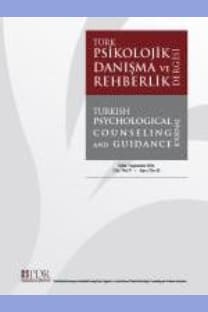Çocuk Yetiştirme Stilleri ve Benlik Saygısı Arasındaki İlişki
Bu çalismanin amaci, çocuk yetistirme stilleriyle benlik saygisi arasindaki iliskileri saptamaktir. Arastirmada ayrica, bu iliskilerin cinsiyete göre degisip degismedigi de incelenmistir. Arastirma, 755 (354 kiz, 401 erkek) lise ögrencisi üzerinde yürütülmüstür. Arastirmada biri Rosenberg Benlik Saygisi Ölçegi, digeri Çocuk Yetistirme Stilleri Envanteri olmak üzere iki ölçme araci kullanilmistir. Ögrenciler Çocuk Yetistirme Stilleri Envanterinin
iki boyutundan (kabuVilgi ve kontrol/denetleme) elde ettikleri puanlara göre açiklayici/otoriter, izin verici/ihmalkar, otoriter, izin verici/simartan ve ayirt edilemez olmak üzere 5 ayri çocuk yetistirme stili kategorisine atanmislardir. Ögrencilerin benlik saygisi puanlarina uygulanan 2 (cinsiyet) X 5 (çocuk yetistirme stilleri) ANOVA sonuçlari, anne babalarini otoriter algilayan ögrencilerin benlik saygisi puan ortalamasinin açiklayici/otoriter ve izin verici/simartan olarak algilayan gruptan anlamli düzeyde farkli oldugunu göstermistir.
Bulgular, anne babalarini otoriter olarak algilayan ögrencilerin benlik saygisinin açiklayici/otoriter ve izin verici/simartan olarak algilayanlara göre daha düsük olduguna isaret etmektedir.
Anahtar Kelimeler:
-
The Relationship Between Parenting Style and Self-esteem
The purpose of this study was to investigate the relationships of different types of perceived parenting styles and self-esteem. Gender differences were also examined. Rosenberg Self-esteem Scale (RSS) and Parenting Style Inventory (PSI) were administered to 755 (354 females, 401 males) high school students. Based on the two scores (acceptance/involvement and strictness/supervision) obtained from PSI, students were assigned to five parenting styles categories, namely, authoritative, permissive/indulgent, authoritarian, permissive/neglectful, and undifferentiated. The results of2 (gender) X 5 (parenting styles) ANOVA employed to self-esteem scores of the students indicated
that there were significant differences between the self-esteem scores of those who perceived their parents as "authoritarian" and those who perceived their parents as "authoritative" and "permissive/indulgent". These findings suggested that those who perceived their parents as "authoritarian" have relatively low level of self-esteem than those who perceived their parents as "authoritative" and "permissive/indulgent".
Keywords:
-,
- ISSN: 1302-1370
- Başlangıç: 1990
- Yayıncı: -
Sayıdaki Diğer Makaleler
Sınıf Rehberliği Öğrenme Yaşantılarının Düzenlenmesi
Deprem Stresiyle Basa Çıkmanın İyimserlik ve Cinsiyete Göre İncelenmesi
Yas Ölçeği: Geçerlik ve Güvenirlik Çalışması
BasariILI Bir BankacIda BulunmasI Beklenen Kişilik Özellikleri
Ergenler İçin Mantıkdışı İnançlar Ölçeğinin Geliştirilmesi: Geçerlik ve Güvenirlik Çalışmaları
İlişkilerde İnanç Envanterinin (IIE) Geliştirilmesi: Geçerlik ve Güvenirlik Çalışması
Çocuk Yetiştirme Stilleri ve Benlik Saygısı Arasındaki İlişki
